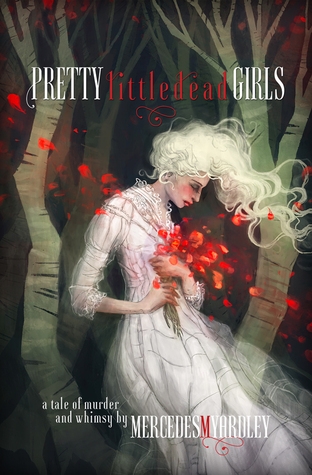
Mercedes M. Yardley
Crystal Lake Publishing
2016
Reviewed by Michael R. Collings
The pedant in me—ever present and growing more powerful by the day—wants to say that praising Mercedes Yardley for her achievement in Pretty Little Dead Girls is the literary equivalent of carrying coals to Newcastle. Given the results of the 2016 Bram Stoker Awards®, and especially the public responses to her receiving the award for Superior Work in Long Fiction for “Little Dead Red,” for me to say that Pretty Little Dead Girls is brilliant seems inadequate, redundant, and ultimately a waste of time.
But it is. That is, it is brilliant. From the opening line to the last, Yardley conjures images of death and horror, murder and mayhem…and constant, refreshing whimsy.
“Bryony Adams was the type of girl who got murdered.” Bryony itself is a whimsical—extravagantly fanciful—and entirely appropriate name for a main character that everyone knows is going to be killed. The name of a poisonous plant, it not only introduces the sense of incipient death but also, and paradoxically, suggests a lightness and freshness that characterizes Bryony Adams. Doomed at birth, and knowing it, she is nonetheless bright and open, constantly comforting those who mourn her oncoming death.
Much of the fun, and most of the mystery, in Pretty Little Dead Girls stems from the fact that everyone who comes into contact with Bryony instantly knows that she will die. For some, the knowledge provides a kind of salvation. For others, including the murderer stalking her, it provides an impetus to action and thereby to damnation.
To complicate matters, Bryony has an even greater enemy: the desert where she was born and where her father lives. In much the same way that the moors becomes an almost sentient character in Brontë’s Wuthering Heights, Yardley’s conception of the desert—vast, empty, inimical to everyone but especially to Bryony—becomes a crucial part of the novel. And Yardley handles it…well, brilliantly.
Pretty Little Dead Girls is a relatively quick read, primarily because so much happens that readers have little sense of external time passing. It is delightful to watch Yardley manipulate words, language, situations, and characters so that any one moment might be simultaneously horrifying, mystifying, and—to use her own description—whimsical.
There is, of course, a deeper sense to the story. Bryony is born to be killed. She knows that. Everyone around her knows that. And the knowledge alters how they behave. For most, it intensifies the sense that life is to be lived, that Bryony is to be protected at all costs, that relationships are precious. And that is as it should be, in the world of Pretty Little Dead Girls and in the world beyond the novel. Everyone is born to die; everyone has a responsibility to look out for others, to protect them; and ultimately everyone must learn the lessons about life and death that Bryony learns when confronted by those who most want her dead: the desert, and her murderer.
Highly recommended.
- Killing Time – Book Review - February 6, 2018
- The Cthulhu Casebooks: Sherlock Holmes and the Miskatonic Monstrosities – Book Review - January 19, 2018
- The Best Horror of the Year, Volume Nine – Book Review - December 19, 2017
- Widow’s Point – Book Review - December 14, 2017
- Sharkantula – Book Review - November 8, 2017
- Cthulhu Deep Down Under – Book Review - October 31, 2017
- When the Night Owl Screams – Book Review - October 30, 2017
- Leviathan: Ghost Rig – Book Review - September 29, 2017
- Cthulhu Blues – Book Review - September 20, 2017
- Snaked: Deep Sea Rising – Book Review - September 4, 2017


